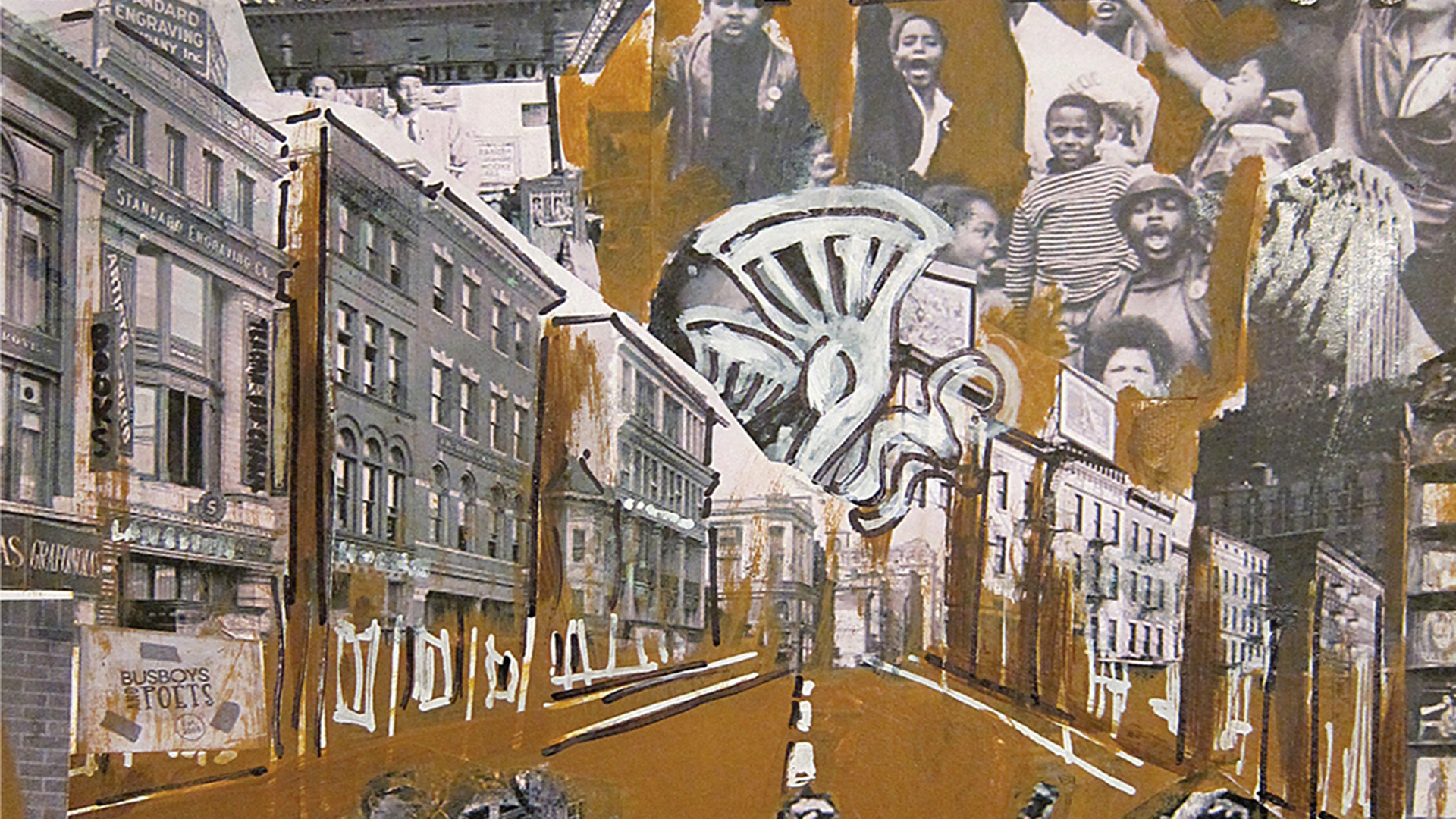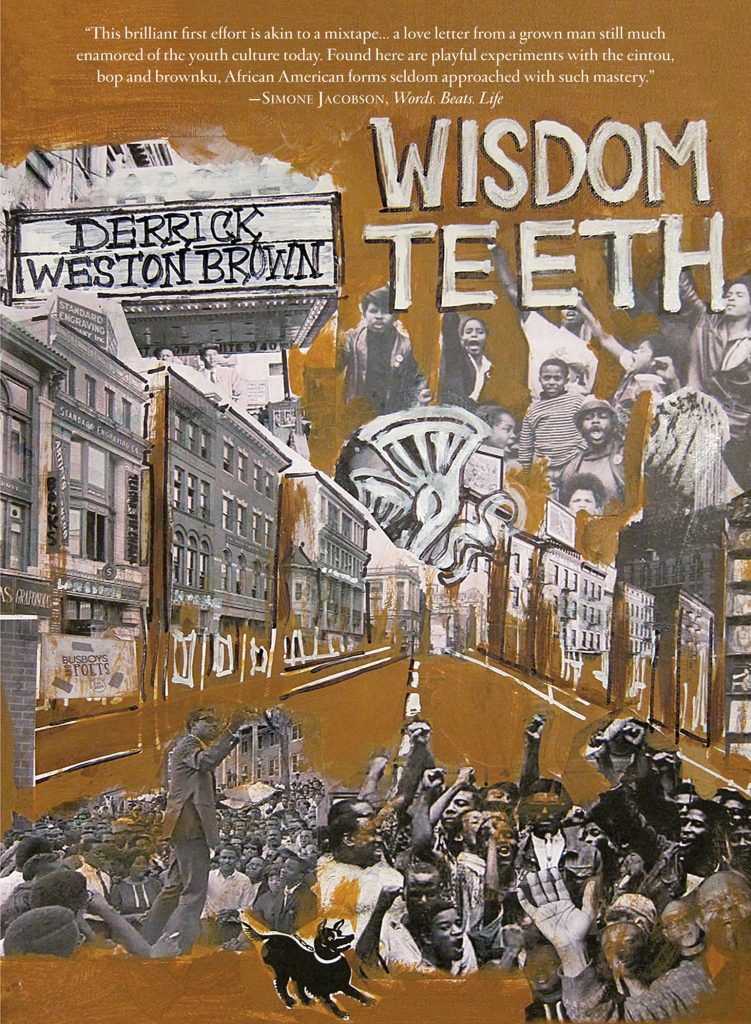By Katie O’Hare
Split this Rock
July 15, 2011
After reading Derrick Weston Brown’s Wisdom Teeth, it’s hard to believe this is his first collection of poems. As Busboys and Poets’ first Poet-In-Residence, Brown approaches his poetry with an incredible confidence, which often touches on tense topics of history and culture.
The collection begins with a clever poem, “Hourglass Flow,” about the struggle of writing and being stuck inside one’s own head. Brown ricochets blame around from comfort and the city, to competition. However, my favorite blame is “the voice that wants to sound like a poet, but not sound // like a poet wanting to sound like a poet,” which all poets have feared at one point in their lives. This is just one way that Brown says what people think, but hardly say themselves.
He moves through the collection with a cool charisma such as this, even when he explores many voices, like Halle, Paul A, Paul D, Paul F, and Sixo of Tony Morrison’s Pulitzer Prize winning Beloved. Brown dedicates a chapter of his collection called “The Sweet Home Men Series,” which features a few poems of his ongoing series of persona poems from the voices of slaves on the Sweet Home Plantation in Beloved.
The distinguished voices separate the chapter from the rest of the poems in a delightful way, letting them stand strongly on their own, yet they seem to fit perfectly into the collection as a whole with its commentary on history, culture, and race. “The Sweet Home Men Series,” a creative and bold chapter, adds a new layer to the collection that it would feel like something was missing without it.
Wisdom Teeth continues this great discussion of African American culture and history throughout the remaining chapters, writing about giants like Malcolm X and Duke Ellington. A Split This Rock poem of the week, “Duke Ellington’s You St. Lament” is one of my personal favorites, giving weight to the great Duke Ellington mural painted on a brick wall of the True Reformers Building, which looms over U Street. Brown puts a clever spin on the name of the street, and reminds his readers of the history behind the neighborhood, which is quickly gentrifying and—some might say—losing its roots. This poem brings the mural to the foreground of U Street, reminding readers to look up every once in a while and see things for what they are.
While this poem is one of the greats in the collections, there are plenty more that I could recall and write about, but there are more important aspects of Wisdom Teeth to be discussed, like its humor for example. While the collection may not be considered a knee slapper, Brown reminds us that poetry doesn’t always have to be taken so seriously. From a poem about Snagglepuss to clever puns of “You Street,” Brown sews threads of wit through the entire collection, including in his form. He puts his own spin on the haiku form and appropriately titles it “Brownku.” The brownkus in Wisdom Teeth are longer than the standard 5-7-5 syllable haiku, but still maintain a short structure.
Besides his cleverly named forms, Brown also includes a poem about the inner thoughts of awkward tension about being single between a man and a woman trapped in a car together. “In the Car” excludes spacing between some words, creatingafeelingofpanickedfrenzy, accurately portraying how our inner thoughts differ from our outer actions and spoken words. This poem adds a welcomed lightheartedness about dating into a collection otherwise filled with more serious topics.
Brown’s many voices and talents offer something for everyone as they read through the collection. But don’t take my word for it. Here’s what other authorities in the poetic world have to say about Brown’s debut collection—
“Full of wit and whimsy, Wisdom Teeth postulates a poetics of heart-whole appreciation and honesty—for love and life, for family and friends, for literature and history, for pop culture and the poet’s ever-cognizant powers of observation.” —Tony Medina, author of My Old Man Was Always on the Lam
“We need more songs like this young man’s right here. Truth cuts its way beneath the unspoken like new teeth on their way to light. Son of Langston, come on through.” —Ruth Forman, author of Prayers Like Shoes
Read the collection yourself and decide which poem your favorite. And come him read this Sunday at “Sunday Kind of Love” at Busboys and Poets at 5 pm.
****
Kaitie O’Hare is a student at American University and an intern at Split This Rock.
****
Split
This Rock received a review copy of Wisdom Teeth, PM Press, $14.95. The
book is available from the press, and from the Teaching for Change
bookstore, online and at Busboys and Poets at 14th and V.







